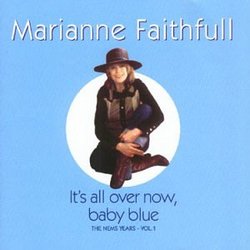A Real Alternative
Steven Haarala | Mandeville, LA USA | 09/11/2006
(5 out of 5 stars)
"I have to begin by admitting a strong bias in favor of this singer, to me a most fascinating creature. She was an intimate of The Beatles, The Stones and everyone who was anyone in 60's London. She was addicted to serious drugs, and survived. She has been rich and poor, celebrated and scorned. Each of her albums represents, to some degree, an experiment. Her voice has gone from sweet to, well, not so sweet. And she doesn't just "sing" a song; she "re-enacts" it, and takes you into it with her. This album represents for me the missing link which explains how she went from the fragile, feminine, folky Marianne of the 60's to the tough, uncompromising, searing songstress of 1979's "Broken English". The 70's were not an easy time for her. This CD is a collection of songs she recorded in the 70's, many of which were never even released. The variety of material presented is considerable. She offers one song from each of Bob Dylan's classic mid-60's albums: "It's All Over Now Baby Blue" from "Bringing It All Back Home"; "It Takes A Lot To Laugh, It Takes A Train To Cry" from "Highway 61 Revisited"; and "Visions of Johanna" from "Blonde On Blonde". Her interpretations work amazingly well, especially the first, the title song of the collection. I also like the cynical "Chords Of Fame" by Phil Ochs, Cat Stevens' portrait of the broken "Sad Lisa", the funky "Crazy Lady Blues", Jessi Colter's "I'm Not Lisa", the wistful "Dreamin' My Dreams", and "Lady Madeleine", co-written by Marianne. There is also material by Tim Hardin, James Taylor, George Harrison, Jackie de Shannon and Waylon Jennings. All the tracks have musical backings which are to some degree folk, rock, pop, country, or some combination thereof. The arrangements are not really remarkable, but they adequately support Marianne's interpretations. Marianne wasn't mainstream in the 70's, and she certainly isn't now. She is "alternative" in the true sense of the word, and very much worth listening to. I find her damaged voice compelling, even comforting, and I appreciate the irony in the fact that by transforming her suffering and defeats into art, she has achieved emotional victory and a measure of commercial success through the years."


 Track Listings (20) - Disc #1
Track Listings (20) - Disc #1